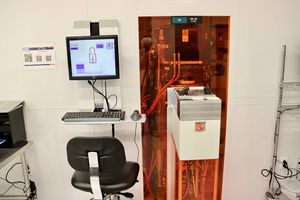Difference between revisions of "SPTS Si DRIE"
| Line 29: | Line 29: | ||
== Resources == | == Resources == | ||
| − | Training | + | [https://www.youtube.com/watch?v=UmRFj_2kdJ8 Training Part 1, Introduction & Wafer Cleaning] |
| + | [https://www.youtube.com/watch?v=8zW80SfvrTM Training Part 2, Operating The Tool] | ||
| − | |||
===== SOPs & Troubleshooting ===== | ===== SOPs & Troubleshooting ===== | ||
* [https://repository.upenn.edu/scn_sop/11 QNF SOP] | * [https://repository.upenn.edu/scn_sop/11 QNF SOP] | ||
Revision as of 13:47, 29 March 2022
 |
|
| Tool Name | SPTS Si DRIE |
|---|---|
| Instrument Type | Etch |
| Staff Manager | Sam Azadi |
| Lab Location | Bay 2 |
| Tool Manufacturer | SPTS |
| Tool Model | Rapier |
| NEMO Designation | {{{NEMO_Designation}}} |
| Lab Phone | XXXXX |
| SOP Link | SOP |
Description
SPTS Rapier is an anisotropic dry etch tool. The tool uses Bosch Process to etch silicon with high selectivity and nearly vertical sidewalls. Bosch process consists of two steps: 1) Deposition of a passivation layer, using C4F8 gas. This passivation layer is a polymer that protects the sidewalls from being etched. 2) A nearly vertical plasma etch step using SF6. A bias is applied in the chamber that forces the ions to attack the surface vertically and etch through the passivation layer at the bottom of the trench, exposing the silicon underneath. That Si is then etched within the same step. The passivation layer is also deposited inside the chamber and the etch results in a layer of deposited polymer inside the chamber walls which makes it critical to run a cleaning recipe at the end of each etch run.
Shorter cycle times result in smoother sidewalls while longer cycle times achieve higher etch rate. The tool in QNF is connected to Ar, O2,N2, C4F8, and SF6 gases.
Applications
- Deep etching of Si
Resources
Training Part 1, Introduction & Wafer Cleaning Training Part 2, Operating The Tool